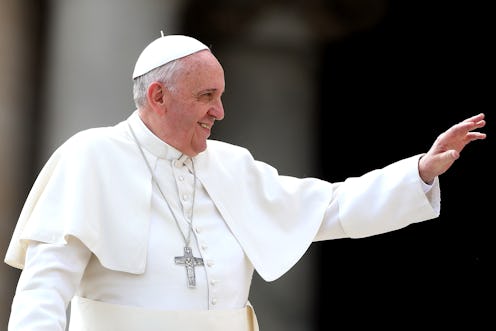News
Pope Francis Is Just Like You, Goes To Confession
In a break with tradition Friday, Pope Francis confessed his sins before a priest, and set a new precedent for the papacy. Which is appropriate for the current Pope, whose legacy of just one year is shaping up to be one of humility, forgiveness, and reform (well, relatively.) Past popes heard confessions at the St. Peter's Basilica, nestled within the confines of Vatican City, for the occasion of Good Friday, but Francis opted to show up weeks ahead of time, and with his own sins in mind.
Rocco Palmo, the prominent Catholic blogger of Whispers in the Loggia , described the event as unprecedented. He noted that while past Popes like John Paul II and Benedict VXI have administered the confessional sacrament publicly, "no Pope has ever been seen as a penitent."
The move is in keeping with the approach Francis has taken since his inauguration last year: Seeking to dismiss boundaries between him and his adherents; toning down his personal opulence; stressing a new style of rhetoric; and eschewing some of the grandeur and status of his position.
Taking confession in full, public view of onlookers, and while on camera, is an example of the last of those methods — the prevailing message of his papacy to-date is that the new guy is more of an everyman than the old ones, and one who doesn't see himself as having less reason to confess than any other member of the Church.
It's been a busy year for Catholic Church, which now boasts a Pope who's been featured as LGBT magazine The Advocate's 2013 Person of the Year; who washes the feet of inmates; and who sneaks out of the Vatican at night, in normal priest-wear, to minister to the homeless.
Pope Francis has also warned of his Church's "obsession" with fixating on its moral and social stances like homosexuality and abortion, saying "the dogmatic and moral teachings of the Church are not all equivalent," and describing the stakes as such:
We have to find a new balance, otherwise even the moral edifice of the church is likely to fall like a house of cards, losing the freshness and fragrance of the Gospel.
In spite of his softer, more soothing words, the Catholic Church's doctrines have not changed. Abortion is still forbidden, and homosexuality is still deemed a moral disorder aligned towards "intrinsic evil." But all reforms have to start somewhere, and in Pope Francis, Catholics have a leader who seems interested in his own spiritual grace and frailty, and isn't afraid to put it on display.
